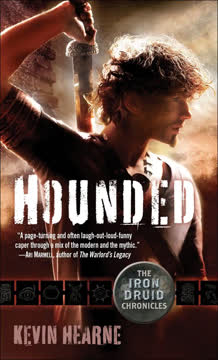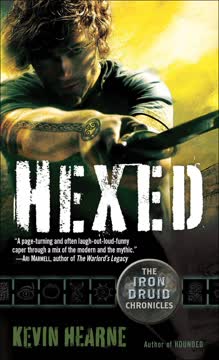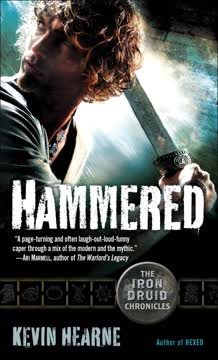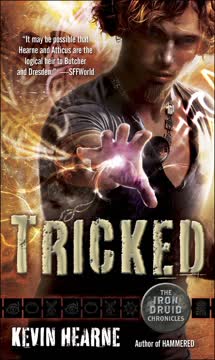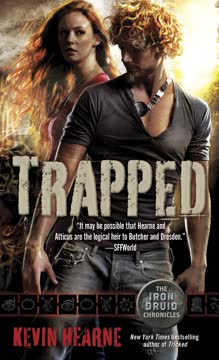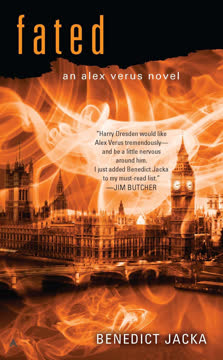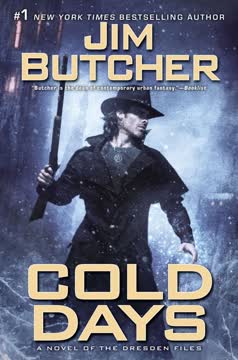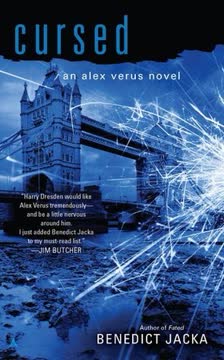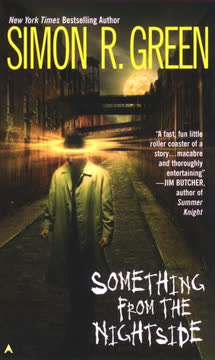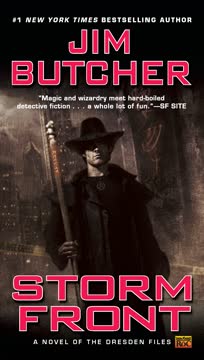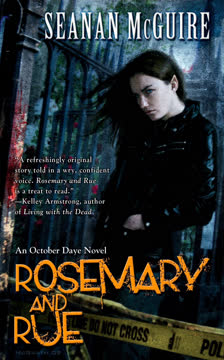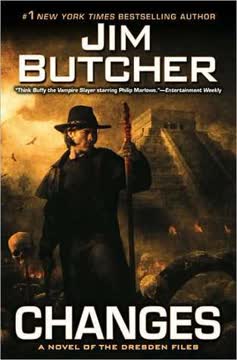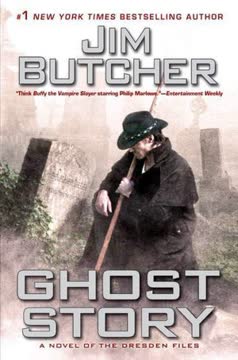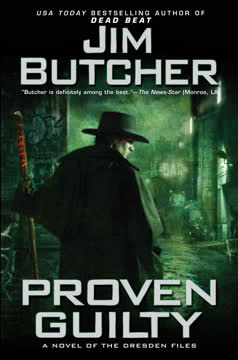Plot Summary
Ancient Druid's Modern Disguise
Atticus O'Sullivan, a 2,100-year-old Druid, lives in Tempe, Arizona, under the guise of a young Irishman. He runs an occult bookshop, Third Eye Books and Herbs, and enjoys the anonymity of modern life. His youthful appearance and tattoos help him blend in, but his true identity is a secret. Atticus has survived centuries by avoiding the wrath of Aenghus Óg, a Celtic god who seeks the magical sword Fragarach, which Atticus possesses. The sword, capable of cutting through any armor, is hidden under layers of magical protection. Atticus's life is a delicate balance of maintaining his cover while preparing for the inevitable confrontation with Aenghus Óg.
A Deadly Encounter with Faeries
Atticus's peaceful life is shattered when a group of faeries, sent by Aenghus Óg, ambush him outside his shop. Using his Druidic powers and combat skills, Atticus defeats the faeries, but not without injury. The attack confirms his fears that Aenghus Óg has found him. Atticus's paranoia, honed over centuries, proves to be a survival skill as he navigates the modern world filled with hidden threats. The encounter leaves him wary and on high alert, knowing that more dangers are likely to follow.
The Morrigan's Ominous Warning
The Morrigan, a Celtic goddess of war and death, visits Atticus in her crow form. She warns him that Aenghus Óg is coming for him and that he must flee to avoid a mortal doom. Despite her ominous warning, Atticus is skeptical, having heard similar threats before. The Morrigan's visit underscores the seriousness of the threat and the precariousness of Atticus's situation. Her presence is a reminder of the ancient forces at play and the dangerous game Atticus is caught in.
Brewing Trouble with Witches
Emily, a member of the local witch coven, approaches Atticus for a potion to make Aenghus Óg impotent. The request is a trap, designed to provoke Aenghus Óg's wrath against Atticus. Despite the danger, Atticus agrees to help, hoping to gain the coven's favor. However, the witches' true allegiance is uncertain, and their involvement adds another layer of complexity to Atticus's predicament. The encounter highlights the treacherous alliances and hidden agendas in the magical community.
Fir Bolgs and Legal Intrigues
Atticus faces an attack from Fir Bolgs, giant warriors sent by Aenghus Óg. With the help of his vampire lawyer, Leif, and his wolfhound, Oberon, Atticus defeats the giants. However, the battle leaves a mess that attracts police attention. Detectives Jimenez and Fagles, under Aenghus Óg's influence, search for Oberon and the sword. Atticus's legal team, including werewolf lawyer Hal, works to protect him from the police's overreach. The legal maneuvering and magical threats converge, testing Atticus's ability to maintain his cover and protect his allies.
A Violent Confrontation Unfolds
The scene is chaotic as Detective Fagles, driven by rage and injustice, attempts to draw his weapon. The situation escalates quickly, resulting in a cacophony of gunfire that leaves Fagles dead. Atticus, injured and struggling to breathe, whispers to his werewolf lawyer, Hal, about his need to draw power from the earth to heal. Despite the police's insistence on waiting for paramedics, Hal, defying protocol, carries Atticus outside to the grass, where he begins to heal himself. Atticus instructs Hal to retrieve his invisible sword, Fragarach, and to ensure all traces of his blood are cleaned from the scene, highlighting the precariousness of his situation and the need for secrecy.
A New Alliance Forms
Atticus meets with Granuaile, a young woman who has been possessed by the spirit of Laksha, an ancient witch. Laksha offers to help Atticus in exchange for his assistance in regaining her freedom. The scene highlights the complex web of alliances and betrayals that Atticus must navigate, as he weighs the risks and benefits of accepting Laksha's offer. Atticus's decision to accept Granuaile as his apprentice and ally underscores his willingness to take bold action in the face of danger, as he prepares for the final showdown with his enemies.
A Final Showdown Approaches
As Atticus and his allies prepare for the final confrontation with Aenghus Óg and his forces, they face a series of challenges and betrayals. The scene highlights the escalating stakes of the conflict, as Atticus must rely on his allies and his own resourcefulness to survive. The tension builds as Atticus confronts the reality of the divine conflict he is caught in, and the need to take decisive action to protect himself and his allies. The stage is set for a dramatic and dangerous showdown, as Atticus prepares to face his enemies and determine the fate of his world.
Characters
Atticus O'Sullivan
Atticus O'Sullivan, the last of the Druids, is a 2,100-year-old magical being living in modern-day Tempe, Arizona. He is intelligent, resourceful, and skilled in both magic and combat, using his abilities to navigate the complex web of supernatural threats that surround him. Atticus's possession of the magical sword Fragarach makes him a target, but it also provides him with a powerful means of defense. His long life has made him cautious and paranoid, but also deeply knowledgeable about the magical world. As he confronts the divine conflict that threatens his life, Atticus must rely on his allies and his own resourcefulness to survive.
Oberon
Oberon is Atticus's Irish wolfhound, bound to him through a special connection that allows them to communicate telepathically. Oberon is fiercely loyal and protective, often providing comic relief with his simple yet insightful observations. Despite his gentle nature, Oberon is a formidable ally in battle, capable of taking down enemies with his strength and speed. His bond with Atticus is one of mutual respect and affection, and he plays a crucial role in Atticus's life, providing companionship and support as they navigate the dangers of the supernatural world together.
Aenghus Óg
Aenghus Óg is a powerful Celtic deity who seeks to reclaim the sword Fragarach from Atticus. He is manipulative, ruthless, and willing to use any means necessary to achieve his goals. Aenghus's pursuit of the sword is part of a larger plan to increase his power and influence. He is a master of deception and has enlisted various allies, including witches and demons, to aid him in his quest. Aenghus's enmity with Atticus is personal and longstanding, making him a formidable adversary in the divine conflict that threatens Atticus's life.
The Morrigan
The Morrigan is a Celtic goddess who takes an interest in Atticus's survival, partly to vex Aenghus Óg. She is enigmatic, powerful, and not entirely trustworthy, but her warnings and interventions have saved Atticus on more than one occasion. The Morrigan's motivations are complex, and her allegiance is primarily to herself. Her presence in Atticus's life is both a blessing and a curse, as she can be as dangerous as she is helpful, and her involvement in the divine conflict adds an additional layer of complexity to Atticus's situation.
Flidais
Flidais is a Celtic goddess who visits Atticus with news of Aenghus Óg's pursuit. Her involvement leads to unintended consequences, including the death of a park ranger and increased police scrutiny. Flidais's true intentions are unclear, and her actions complicate Atticus's already precarious situation. Her presence highlights the unpredictable nature of dealing with deities and the potential for collateral damage, as Atticus must navigate the challenges of the divine conflict while also dealing with the fallout of Flidais's actions.
Brighid
Brighid is a powerful Celtic goddess who seeks Atticus's help in countering Aenghus Óg's plans. She offers him the power of Cold Fire to combat demons and provides crucial information about Aenghus's alliances. Brighid's visit is both a warning and an opportunity, as she seeks to maintain her position among the Tuatha Dé Danann. Her support is a significant boon for Atticus, but it also places him at the center of a divine conflict, as he must navigate the challenges of the supernatural world while also dealing with the consequences of Brighid's involvement.
Hal Hauk
Hal is a member of the local werewolf pack and serves as Atticus's daytime lawyer. He is knowledgeable, quick-witted, and adept at navigating the legal system. Hal's presence provides Atticus with a measure of protection against the police and other mundane threats. His loyalty to the pack and his friendship with Atticus make him a reliable ally in times of need, as he works to protect Atticus from the supernatural threats that endanger his life.
Granuaile
Granuaile is a young woman who becomes Atticus's apprentice, seeking to learn the ways of the Druids and gain magical power. She is intelligent, determined, and eager to learn, but she also harbors a secret: she is possessed by the spirit of Laksha, an ancient witch. Granuaile's relationship with Atticus is complex, as she must navigate the challenges of her apprenticeship while also dealing with the presence of Laksha. Her determination to become a Druid and her willingness to ally with Atticus make her a valuable asset in the conflict against Aenghus Óg.
Laksha
Laksha is a powerful witch who has survived for centuries by transferring her spirit into various bodies. She is intelligent, cunning, and resourceful, but she is also burdened by the weight of her past actions. Laksha seeks redemption and freedom from her current state, and she offers to help Atticus in exchange for his assistance in regaining her independence. Her presence in Granuaile's life complicates matters, as she must navigate the challenges of her own redemption while also dealing with the divine conflict that threatens Atticus and his allies.
Emily
Emily is a member of the local witch coven, the Sisters of the Three Auroras. She approaches Atticus for a potion to make Aenghus Óg impotent, but her request is part of a larger scheme orchestrated by Aenghus. Emily's actions are driven by her coven's allegiance to Aenghus, and her interactions with Atticus are marked by hostility and deception. Her presence in Atticus's life is a reminder of the treacherous nature of magical alliances, as Atticus must navigate the challenges of the divine conflict while also dealing with the threat posed by Emily and her coven.
Plot Devices
Fragarach
Fragarach, the Answerer, is a magical sword capable of cutting through any armor. It is a coveted artifact, and its possession is central to the conflict between Atticus and Aenghus Óg. The sword's power and history make it a symbol of authority and a key to Aenghus's larger plans. Atticus's efforts to protect Fragarach drive much of the narrative, as he navigates threats from both mortal and divine adversaries, and the sword's power becomes a crucial element in the final showdown with Aenghus Óg.
Cold Fire
Cold Fire is a gift from Brighid, allowing Atticus to combat demons with a powerful, ice-like flame. This ability is a significant advantage in the battle against Aenghus Óg's allies, but it comes with limitations and risks. The introduction of Cold Fire expands Atticus's arsenal and emphasizes the escalating stakes of the conflict, as he must navigate the challenges of the divine conflict while also dealing with the consequences of using such a powerful and dangerous ability.
Magical Alliances
The story is marked by a complex web of magical alliances, with various factions vying for power and influence. Atticus must navigate these shifting allegiances, discerning friend from foe and making strategic decisions to protect himself and his allies. The theme of trust and betrayal is central to the narrative, as Atticus grapples with the consequences of past actions and the uncertainty of future alliances. The interplay of magical forces and hidden agendas adds depth and tension to the story, as Atticus must navigate the challenges of the divine conflict while also dealing with the threat posed by his enemies.
Analysis
"Hounded" by Kevin Hearne is a captivating blend of modern fantasy and ancient mythology, exploring themes of survival, identity, and the complexities of power. Through the character of Atticus O'Sullivan, Hearne delves into the challenges of living a double life, balancing the mundane with the magical, and the constant threat of exposure. The narrative is rich with Celtic mythology, bringing ancient deities and magical artifacts into a contemporary setting, creating a dynamic and engaging world. The story's exploration of trust, betrayal, and the consequences of past actions resonates with readers, offering a reflection on the nature of alliances and the cost of power. Hearne's ability to weave humor, action, and suspense into the narrative makes "Hounded" a compelling read, appealing to fans of urban fantasy and mythology alike.
Last updated:
FAQ
0. Synopsis & Basic Details
What is Hounded about?
- Ancient Druid's Modern Life: Hounded introduces Atticus O'Sullivan, the last living Druid, a 2,100-year-old immortal hiding in plain sight as a young, tattooed Irishman running an occult bookstore in Tempe, Arizona. His peaceful, anachronistic existence is built on avoiding the wrath of Aenghus Óg, a powerful Celtic god who covets Fragarach, Atticus's legendary magical sword.
- Escalating Divine Conflict: The story quickly plunges Atticus into a series of escalating confrontations as Aenghus Óg finally tracks him down. Atticus must navigate attacks from faeries, giants, and a treacherous coven of witches, all while dealing with mundane police investigations and the complex, often self-serving, interventions of other Celtic deities like The Morrigan, Flidais, and Brighid.
- Survival, Wit, and Loyalty: At its core, Hounded is a tale of survival, blending ancient mythology with urban fantasy. Atticus relies on his centuries of wisdom, sharp wit, Druidic magic, and the unwavering loyalty of his telepathic Irish wolfhound, Oberon, to protect himself, his friends, and the delicate balance between the mortal and supernatural worlds.
Why should I read Hounded?
- Unique Blend of Humor and Action: Readers seeking a fresh take on urban fantasy will love Atticus's snarky first-person narration, which seamlessly blends ancient wisdom with modern pop culture references. The book offers a compelling mix of fast-paced action sequences and genuinely funny dialogue, making for an entertaining and engaging read.
- Rich Mythological Tapestry: Kevin Hearne masterfully weaves together Celtic mythology with a contemporary setting, introducing a pantheon of gods, witches, and werewolves that feel both ancient and refreshingly new. It's a fantastic entry point for those curious about Druid lore and Irish legends, presented with a modern, accessible twist.
- Deeply Relatable Characters: Despite his immense age and power, Atticus is a surprisingly relatable protagonist, grappling with themes of loneliness, loyalty, and the burden of immortality. His bond with Oberon, his loyal wolfhound, is a highlight, offering heartwarming moments amidst the supernatural chaos and providing a strong emotional core to the story.
What is the background of Hounded?
- Celtic Mythology Foundation: The world of Hounded is deeply rooted in Celtic mythology, particularly Irish lore. Atticus O'Sullivan is a Druid, a practitioner of ancient Celtic magic tied to the earth. The primary antagonists and supporting deities—Aenghus Óg, The Morrigan, Flidais, Brighid—are all figures from the Tuatha Dé Danann, the mythological race of gods and heroes in Irish tradition.
- Urban Fantasy Setting: The story is set in modern-day Tempe, Arizona, a stark contrast to the ancient European forests typically associated with Druids. This urban environment, with its "low god density" and lack of Fae-friendly trees, serves as Atticus's chosen hiding place, highlighting the clash between ancient magic and contemporary life.
- Historical & Cultural Allusions: Atticus's 2,100-year lifespan allows for rich historical context, with references to Roman times, Genghis Khan, Shakespeare, and various cultural shifts. The narrative also subtly explores the decline of traditional magic with the advent of the Iron Age and the rise of monotheistic religions, framing Atticus as a relic in a rapidly changing world.
What are the most memorable quotes in Hounded?
- "There are many perks to living for twenty-one centuries, and foremost among them is bearing witness to the rare birth of genius." (Chapter 1): This opening line immediately establishes Atticus's ancient perspective and dry wit, setting the tone for his unique observations on humanity and history. It encapsulates his detached yet appreciative view of mortal achievements, a core aspect of his character.
- "Being honorable is an excellent way to get yourself killed." (Chapter 5): Atticus's pragmatic philosophy, born from millennia of survival, is starkly revealed in this quote. It underscores his willingness to employ cunning and unconventional tactics, contrasting with traditional heroic ideals and explaining his long-lived success against powerful foes.
- "The universe is exactly the size that your soul can encompass. Some people live in extremely small worlds, and some live in a world of infinite possibility." (Chapter 21): Spoken to the Widow MacDonagh, this profound statement encapsulates a central theme of Hounded: the expansion of one's worldview beyond the mundane. It highlights Atticus's role as a keeper of forgotten truths and challenges readers to consider the vastness of reality.
What writing style, narrative choices, and literary techniques does Kevin Hearne use?
- First-Person, Conversational Narrative: Hearne employs a highly engaging first-person perspective, narrated by Atticus O'Sullivan. This choice allows for a witty, conversational tone, filled with Atticus's internal monologues, sarcastic asides, and pop culture references, making the ancient Druid feel remarkably contemporary and relatable.
- Seamless Blend of Ancient and Modern: A key technique is the juxtaposition of ancient mythological elements with modern-day settings and sensibilities. Atticus's internal thoughts often jump from Roman history to Starbucks, or from Celtic gods to Monty Python, creating a unique narrative voice that is both informative and humorous.
- Foreshadowing and Subversion of Tropes: Hearne subtly weaves in foreshadowing through prophecies (like The Morrigan's Ogham wands) and character interactions, building suspense. He also frequently subverts fantasy tropes, presenting gods with very human flaws and challenging traditional notions of heroism and villainy, adding depth and unpredictability to the plot.
1. Hidden Details & Subtle Connections
What are some minor details that add significant meaning?
- Ogham Wand Prophecy Details: The specific Ogham wands drawn by The Morrigan—Fearn (warrior), Tinne (challenges), Ngetal (fear), Ura (surprises), Idho (death)—are not just generic bad omens. Their precise arrangement, with "The Yew crossed the Alder," explicitly foretells the warrior's (Atticus's) death, adding a layer of fatalism to his journey and raising the stakes for his confrontation with Aenghus Óg.
- Mr. Semerdjian's Recurring Role: Atticus's Lebanese neighbor, Mr. Semerdjian, initially appears as a source of mundane annoyance (complaining about Oberon's poop). However, his repeated false 911 calls and general suspicion become a subtle motif for how Atticus's supernatural life constantly brushes against and complicates the ordinary world, forcing him to maintain his disguise even in the face of petty human grievances.
- Radomila's Cloak on Fragarach: The magical cloak placed on Fragarach by Radomila is more than just an invisibility spell; it contains a hidden tracer. This subtle detail is crucial, as it allows Aenghus Óg to attune Fagles to the sword's presence, revealing the depth of the witches' betrayal and forcing Atticus to remove the cloak, thereby changing his strategic approach to the conflict.
What are some subtle foreshadowing and callbacks?
- Flidais's "Revenge" as Brighid's Manipulation: Flidais's initial claim of seeking revenge on Aenghus Óg for ruining her hunt (Chapter 6) is later revealed to be a calculated move orchestrated by Brighid (Chapter 25). This callback subtly foreshadows the deeper, more complex political machinations among the Tuatha Dé Danann, showing Atticus is a pawn in a larger divine game, even when he thinks he's acting independently.
- The Morrigan's Self-Serving Bargain: The Morrigan's early agreement to grant Atticus immortality (Chapter 2) is later revealed to have a hidden clause: she told Aenghus Óg about it, knowing he would summon Death to claim Atticus, thus ensuring Aenghus's eternal torment in hell if Atticus won (Chapter 25). This callback highlights The Morrigan's cunning and self-interest, reinforcing that her "friendship" is purely transactional and strategic.
- Atticus's "Flesh Wound": Atticus's repeated assertion that his gunshot wound is "just a flesh wound" (Chapter 17), a direct callback to Monty Python, humorously downplays his severe injury. However, it subtly foreshadows the true extent of his healing abilities and resilience, which are far beyond mortal comprehension, and his determination to recover quickly for the impending battle.
What are some unexpected character connections?
- Leif Helgarson's Hatred for Thor: While Leif is Atticus's vampire lawyer, his intense, unspoken hatred for Thor is a recurring, subtle thread. This connection, hinted at through his fangs popping out at the mention of Thor (Chapter 5) and his desire for Atticus to kill him (Epilogue), reveals a deeper, personal history that transcends his professional duties and sets up future conflicts in the series.
- Granuaile's Possession by Laksha: The seemingly innocent barmaid Granuaile is revealed to be a vessel for Laksha, an ancient Indian witch (Chapter 19). This unexpected connection transforms Granuaile from a potential love interest into a crucial magical ally and apprentice, highlighting the hidden depths of seemingly minor characters and the interweaving of diverse mythologies.
- The Tempe Pack's Alliance with Atticus: The werewolf pack, led by Gunnar Magnusson and including Hal Hauk and Snorri Jodursson, forms an unlikely but powerful alliance with Atticus. Their shared enmity for Thor (Chapter 5) and their loyalty to Hal, who is kidnapped alongside Oberon, solidifies their bond, demonstrating that common enemies can forge strong, cross-species alliances in the supernatural world.
Who are the most significant supporting characters?
- Oberon, the Telepathic Wolfhound: Beyond being a loyal pet, Oberon serves as Atticus's emotional anchor and moral compass, often providing comic relief and insightful observations that cut through Atticus's cynicism. His unique telepathic bond with Atticus (Chapter 3) is central to Atticus's character development, revealing his softer, more vulnerable side and highlighting the profound importance of companionship in an immortal life.
- Hal Hauk, the Pragmatic Werewolf Lawyer: Hal Hauk is more than just legal counsel; he represents Atticus's connection to the broader supernatural community and provides a grounded, strategic perspective on both magical and mundane problems. His unwavering loyalty and legal acumen (Chapter 8) are crucial for navigating police scrutiny and protecting Atticus's interests, showcasing the necessity of practical allies in a world of gods.
- The Morrigan, the Ambiguous Death Goddess: The Morrigan's role transcends simple ally or antagonist; she is a force of nature whose interventions are always self-serving but often benefit Atticus. Her complex motivations and willingness to manipulate events (Chapter 25) underscore the moral ambiguity of the divine world and force Atticus to constantly question allegiances, adding a layer of unpredictable tension to his survival.
2. Psychological, Emotional, & Relational Analysis
What are some unspoken motivations of the characters?
- Atticus's Deep-Seated Loneliness: Despite his outward bravado and wit, Atticus's long life has left him with a profound, unspoken loneliness. His deep affection for Oberon (Chapter 12) and his willingness to connect with mortals like the Widow MacDonagh (Chapter 18) reveal a yearning for companionship and stability, a quiet counterpoint to his constant need for vigilance and escape.
- Brighid's Strategic Self-Preservation: Brighid's decision to ally with Atticus and even orchestrate the kidnapping of Oberon and Hal (Chapter 25) is driven by a desire to maintain her power and position among the Tuatha Dé Danann. Her "distaste" for direct conflict with Aenghus Óg (Chapter 14) is less about moral qualms and more about avoiding personal risk, revealing a pragmatic, self-serving aspect beneath her benevolent facade.
- Aenghus Óg's Insecurity and Narcissism: Aenghus Óg's relentless pursuit of Fragarach and his desire to kill Atticus stem from a deep-seated insecurity and wounded pride, rather than just a lust for power. His humiliation by The Morrigan centuries ago (Chapter 5) and his inability to personally defeat Atticus fuel a vindictive narcissism, making his actions intensely personal and irrational for a god of love.
What psychological complexities do the characters exhibit?
- Atticus's Ancient Pragmatism vs. Modern Empathy: Atticus embodies a complex duality: his ancient Druidic training instilled a pragmatic, often ruthless, approach to survival ("Being honorable is an excellent way to get yourself killed," Chapter 5), yet his long exposure to humanity has cultivated a surprising empathy and protectiveness towards his friends and even the earth itself. This internal conflict drives many of his decisions, such as his disgust at the witches' body-snatching (Chapter 20) and his ultimate decision to fight Aenghus for the land (Chapter 23).
- Oberon's Anthropomorphic Innocence: Oberon, despite being a powerful wolfhound, exhibits a charming psychological innocence, often interpreting complex human and magical situations through a simple, anthropomorphic lens (e.g., his desire for French poodles, his pop culture references, Chapter 12). This innocence provides crucial comic relief and a moral anchor for Atticus, highlighting the purity of their bond against the backdrop of divine treachery.
- The Gods' Human-like Flaws: The Tuatha Dé Danann, despite their immense power, display strikingly human psychological flaws. Aenghus Óg's petty vindictiveness, Brighid's calculated manipulation, and The Morrigan's self-serving capriciousness (Chapter 25) reveal that even divine beings are susceptible to pride, jealousy, and self-interest, making them complex and often unpredictable forces in Atticus's life.
What are the major emotional turning points?
- Oberon's "Murder" of the Park Ranger: The moment Oberon, under Flidais's magical compulsion, kills the park ranger (Chapter 6) is a major emotional turning point for Atticus. It forces him to confront the collateral damage of divine interference and the vulnerability of his beloved companion, solidifying his resolve to protect Oberon at all costs and leading to his decision to stop running.
- Atticus's Betrayal by the Witches: Emily's revelation that the witch coven is allied with Aenghus Óg and that the "impotence tea" was a trap (Chapter 9) is a significant emotional blow. It shatters Atticus's cautious trust and ignites a deep-seated anger, pushing him from defensive maneuvering to a more aggressive stance against his enemies, fueled by a sense of personal affront and betrayal.
- Atticus's Decision to "Fight Like Hell": After being shot and manipulated by multiple deities, Atticus's internal monologue in Chapter 17 marks a pivotal emotional shift. He explicitly rejects running ("Running wasn't attractive to me anymore") and embraces a proactive, confrontational approach ("Bring it, muthafuckas. Bring it."), signaling his transformation from a weary survivor to a determined warrior ready to end the millennia-long chase.
How do relationship dynamics evolve?
- Atticus and The Morrigan: A Transactional Alliance: Their relationship evolves from a wary understanding to a more explicit, albeit still self-serving, alliance. Initially, The Morrigan warns Atticus out of a desire to vex Aenghus Óg (Chapter 3). By the end, she actively lends him power (Chapter 24) in exchange for Aenghus's eternal torment, solidifying a transactional bond where mutual benefit, not affection, drives their interactions.
- Atticus and Brighid: From Worship to Strategic Partnership: Atticus initially views Brighid with reverence, a goddess he worshipped in his youth. However, their dynamic shifts to a strategic partnership when Brighid reveals her own political struggles with Aenghus Óg (Chapter 14). Her manipulation, including orchestrating the kidnapping of Oberon and Hal, reveals a pragmatic side that Atticus must navigate, transforming his worship into a more cautious, yet necessary, alliance.
- Atticus and the Sisters of the Three Auroras: From Distrust to Non-Aggression: Atticus's inherent distrust of witches is confirmed by Emily and Radomila's betrayal. However, the coven's split and Malina's subsequent call (Chapter 25) open the door for a new, albeit fragile, relationship. This evolves into a proposed non-aggression treaty, demonstrating Atticus's willingness to seek pragmatic peace even with former adversaries, rather than pursuing endless conflict.
4. Interpretation & Debate
Which parts of the story remain ambiguous or open-ended?
- The Morrigan's Long-Term Intentions: While The Morrigan aids Atticus in defeating Aenghus Óg, her ultimate goals and allegiance remain ambiguous. Her delight in Aenghus's eternal torment (Chapter 25) and her immediate demand for her borrowed power back suggest a self-serving nature that could easily turn against Atticus in the future, leaving her role as a perpetual wild card.
- The Future of the Split Witch Coven: Malina Sokolowski's new coven, formed after Radomila's death, promises a "mutual nonaggression" treaty with Atticus (Chapter 25). However, the long-term stability and trustworthiness of this new alliance are uncertain, especially given Atticus's deep-seated distrust of witches and the potential for new power dynamics to emerge within the coven.
- **Atticus's
4. Interpretation & Debate
Which parts of the story remain ambiguous or open-ended?
- The Morrigan's Long-Term Intentions: While The Morrigan aids Atticus in defeating Aenghus Óg, her ultimate goals and allegiance remain ambiguous. Her delight in Aenghus's eternal torment (Chapter 25) and her immediate demand for her borrowed power back suggest a self-serving nature that could easily turn against Atticus in the future, leaving her role as a perpetual wild card.
- The Future of the Split Witch Coven: Malina Sokolowski's new coven, formed after Radomila's death, promises a "mutual nonaggression" treaty with Atticus (Chapter 25). However, the long-term stability and trustworthiness of this new alliance are uncertain, especially given Atticus's deep-seated distrust of witches and the potential for new power dynamics to emerge within the coven.
- Atticus's Future in Tempe: With Aenghus Óg defeated and his cover potentially compromised, Atticus's long-term plans for staying in Tempe remain unclear. The increased attention from both supernatural and mortal authorities could force him to relocate, leaving the fate of his bookstore and local relationships uncertain.
What are some possible interpretations of the story's themes?
- The Price of Immortality: Atticus's long life can be seen as both a blessing and a curse. His vast knowledge and power come at the cost of constant vigilance, loneliness, and the burden of witnessing countless human lifetimes. This theme raises questions about the true nature of immortality and whether eternal life is truly desirable.
- The Complexity of Divine Morality: The gods in Hounded are portrayed as deeply flawed and often self-serving entities, challenging traditional notions of divine benevolence. This portrayal can be interpreted as a commentary on the nature of power and the corrupting
Review Summary
Hounded receives mixed reviews, with many praising its humor, fast-paced action, and unique protagonist Atticus O'Sullivan. Readers enjoy the blend of Celtic mythology and modern urban fantasy. The witty dialogue and Atticus' relationship with his dog Oberon are highlights. However, some criticize the character's immaturity and lack of depth given his age. Others find the portrayal of women problematic. Despite flaws, many readers find it an entertaining start to the series and compare it favorably to Jim Butcher's Dresden Files.
The Iron Druid Chronicles Series
Similar Books
Download PDF
Download EPUB
.epub digital book format is ideal for reading ebooks on phones, tablets, and e-readers.
